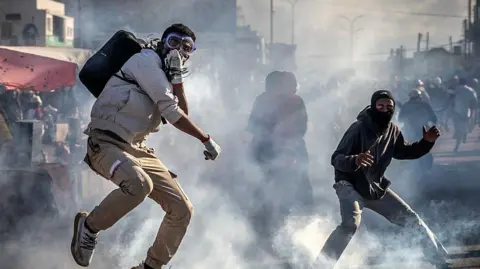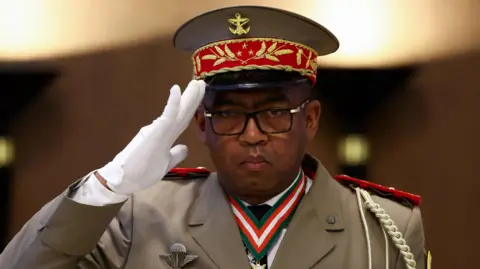Sammy AwamiBBC Africa, Antananarivo,
Basillioh Rukanga and
Omega RakotomalalaBBC Monitoring
 AFP via Getty Images
AFP via Getty ImagesMadagascar’s embattled President Andry Rajoelina has appointed an army general as the new prime minister in a bid to end youth-led protests against his rule.
He said the nation needed a premier “capable of restoring order and the people’s trust” before naming Gen Ruphin Fortunat Zafisambo to the post.
Coming days after the president expressed fears of a coup attempt, the general’s appointment marks a significant militarisation of the government and appears to be an attempt by Rajoelina to secure the army’s backing at a time of heightened tensions.
The protest movement, known as Gen Z Mada, rejected Gen Zafisambo’s appointment, and gave Rajoelina 48 hours to resign.
“As long as Rajoelina remains in power we will continue the struggle,” Gen Z Mada said in a statement.
Former President Marc Ravalomanana, who supports the Gen Z movement, has dismissed the appointment of the new prime minister as “pointless”.
He told the BBC that it “won’t make a difference”, arguing that the general previously worked in the same office and would continue with the same problems the public has been protesting against.
Major opposition parties have openly backed the youth-led protests, with some opposition politicians seen participating in the demonstrations.
The protests began on 25 September, triggered by public anger over repeated water and power cuts and have since morphed into wider dissatisfaction over corruption, high unemployment and the cost-of-living crisis.
Last week, Rajoelina dismissed Prime Minister Christian Ntsay, a civilian, and his entire cabinet in an attempt to placate the protesters.
In a declaration at the presidential palace late on Monday, Rajoelina announced the appointment of Gen Zafisambo, saying the prime minister needed to be “someone clean” and “ready to save Madagascar”.
Gen Zafisambo was the director of the military cabinet in the prime minister’s office until this appointment.
 Reuters
ReutersLast week, the UN said that at least 22 people had been killed and more than 100 injured in the protests, but the government rejected the figures, describing them as based on “rumours and misinformation”.
On Monday, security forces clashed with demonstrators in several cities, as unrest on the Indian Ocean island entered its third week.
Several hundred youths, mostly university students, marched from the outskirts of the capital, Antananarivo, to the city centre.
One young man was wounded and taken to hospital following clashes with the security forces who had erected barricades, AFP news agency reported.
Clashes also took place in the southern city of Toliara and the northern city of Diego Suarez.
Madagascar has been rocked by multiple uprisings since it gained independence in 1960, including mass protests in 2009 that forced former president Ravalomanana to step down and saw Rajoelina come to power.
Rajoelina governed for four years and then returned to power after the 2018 election. The protests mark the most significant challenge he has faced since his re-election in 2023.
In an interview on Tuesday, Ravalomanana told the BBC that he believed the biggest problem with President Rajoelina “is that he doesn’t listen”.
He said he was opposed to the idea of military intervention and would be willing to return to office if the people wanted him to.
Despite its natural resources, Madagascar is one of the poorest countries in the world, with 75% of people living below the poverty line, according to the World Bank.
Only about one-third of Madagascar’s 30 million people have access to electricity, according to the International Monetary Fund (IMF).
More BBC stories on Madagascar
 Getty Images/BBC
Getty Images/BBC
